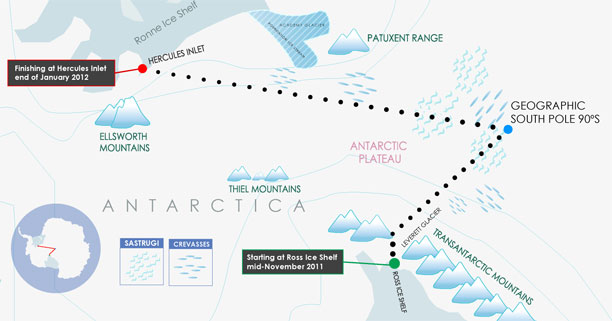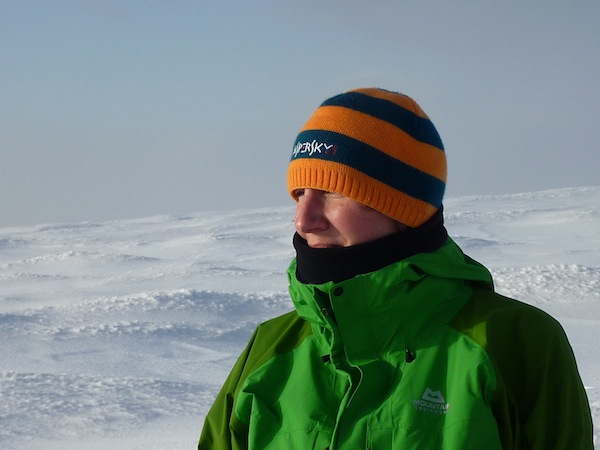Can Felicity Aston conquer Antarctica?
Felicity Aston is a 33-year old British explorer. For the last decade she has been planning and leading expeditions to the coldest regions of the planet.
Now, she’s about to embark on a landmark expedition and a world first: a 1700km (1056 mile), 70-day ski journey. If she makes it, she’ll hold the record for the longest solo journey made by a woman in the Polar Regions; and the first woman in history to cross Antarctica alone.
Here’s a video overview of Felicity’s preparations. And you can follow her journey here.
I caught up with Felicity just before she left.
Q. What inspired you to do this mission?
Curiosity. When I read about the adventures of others I always wonder if I would be capable of doing the same.
Over the last ten years each of my expeditions has pushed me a little further mentally or physically, but I still don’t feel that I have reached my limit. I would like to know where my personal limits are – perhaps I’ll find them on this journey.
Q. What are the specific physical demands you expect to encounter?
Polar travel is all about endurance and stamina.
It’s a slow plod rather than a mad dash. I often think of polar expeditions as a war of attrition – each day out in the field the body gets a little weaker. It’s impossible to stop this gradual deterioration. It’s a bit like overtraining. You have to get the journey finished before your body gets to the point where it starts to break just through exhaustion and overuse!
As well as the distance and the weight pulled (my sledge will weigh around 80 kg [176 lb]), there is also the altitude to take into consideration (the South Pole sits at a height of over 3000 m [nearly 10,000 feet]) and the effect of sastrugi, uneven windblown formations in the snow.
These factors all take their toll eventually.

Map of Felicity's route
Q. How did you train/prepare for these expected demands?
I do a lot of low intensity training to build up endurance and stamina – things like dragging tyres and long hikes.
In the gym I concentrate on particular muscle groups. Squats and lunges prepare the muscles in my legs for skiing, while pulldowns work the muscles between my shoulder blades that otherwise get sore when using poles to ski cross-country.
Q. Why have you decided to make a solo expedition?
The camaraderie and challenge of working with a team has always been one of the elements of an expedition that I enjoy most. Much of my own determination and motivation during a journey comes from the team around me.
I want to know what happens when you take away that support.
What keeps someone going when they are on their own?
Q. Are there particular physical, mental, and/or emotional considerations inherent to a solo mission?
Travelling with teams in the past I have noticed that it is never the individual in trouble that notices – it is always someone else who alerts them to the fact that they are getting too cold, or behaving strangely. This is my biggest concern about travelling alone: there is no one to pick up on those early indications.
It scares me that I may not be able to rely on my own brain, on my own good sense. Instead I need to question all my decisions and make sure that they are made for the right reasons.
Q. What are the specific mental-emotional demands you expect to encounter?
Polar travel is much more of a mental challenge than a physical one. Success or failure has more to do with what is going on in your head than the size of your muscles.
On this trip I will be completely by myself for 70 days, which just adds to the mental pressure of the challenge. Keeping myself motivated and focused for that length of time on my own will be the hardest part.
The Antarctic landscape, although beautiful, is very monotonous. Sensory deprivation might become a problem as the brain begins to fill in the gaps – leading to hallucinations and disorientation.
Q. How did you prepare for these expected demands?
I have been working with a sports psychologist to prepare tools and techniques that will help with the mental challenges of the journey.
These range from visualisation – running through the expedition in my mind in fast-forward – to recalling imagery in great detail and including other senses, imagining smells or noises or tastes. It’s surprisingly difficult and takes some practise!
This is my first solo expedition, so I don’t know how I will be affected mentally by it. I’m lucky to have lots of support to fall back on, including some other women adventurers who have spent long periods of time alone and who have been quick to offer valuable advice.
Q. Why are you the “right woman for the job” here? In other words, what gives you “the right stuff” and confidence that you can/will pull off these crazy shenanigans?
Antarctica is a place very close to my heart and I am looking forward to being alone in that environment, but it’s also a very daunting prospect. Only after 10 years of travelling in the polar environment do I feel confident enough in my own ability and experience to take on a solo journey, so for me, the Kaspersky ONE Trans-Antarctic Expedition is a culmination of everything I have learnt over the last decade.
There is nothing inherently “special” about me. I have just been very lucky to earn the support of Kaspersky Lab, which has enabled me to undertake this journey and explore my own capabilities in this way.
Q. Imagine other women watching you as you progress: What do you want your “audience” to see, learn, and know about you? What ideas, messages, etc. are you hoping to transmit to those of us following your journey?
You can follow my journey through the expedition website (www.kasperskyonetransantarcticexpedition.com) where there will be daily tweets and podcasts from me as well as blogs, videos, pictures and an interactive map.
It is extremely motivating to think of people logging into the site every day to see how I am doing – I feel like I must cover some good distance so that there is something new on the map for them to look at!
I am often invited to speak about my expedition and I genuinely enjoy the simple act of telling a story, of engaging an audience – and it is hugely rewarding when someone who has heard your talk feels inspired to make a decision – be it to run a marathon, start an expedition of their own or make a major life change – to have that sort of impact I think is incredible.
I hope the message that is demonstrated by the expedition is that if you have an ambition the most important thing you have to do is to start on your journey towards making it happen. Then it’s just a matter of perserverance.
“Success or failure has more to do with what is going on in your head than the size of your muscles… If you have an ambition the most important thing you have to do is to start on your journey towards making it happen. Then it’s just a matter of perserverance.”
 |
